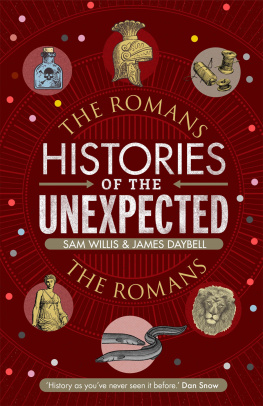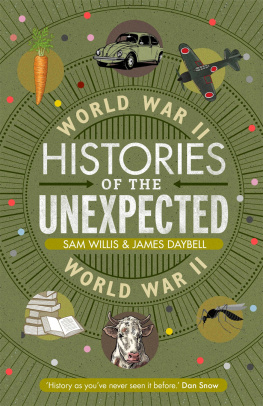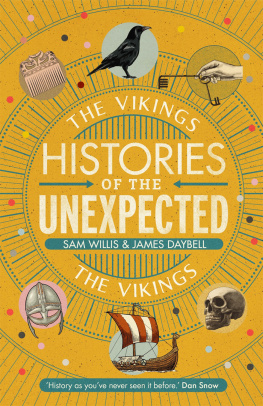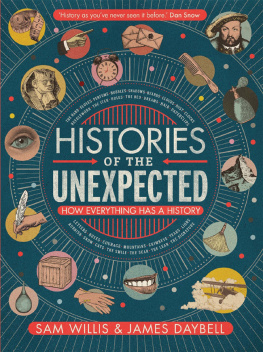Contents
Guide

By the same authors
Histories of the Unexpected
In the same series
Histories of the Unexpected: The Tudors
Histories of the Unexpected: The Vikings
Histories of the Unexpected: World War II

First published in Great Britain in 2019 by Atlantic Books,
an imprint of Atlantic Books Ltd.
Copyright Sam Willis and James Daybell, 2019
The moral right of Sam Willis and James Daybell to be identified as
the authors of this work has been asserted by them in accordance
with the Copyright, Designs and Patents Act of 1988.
All rights reserved. No part of this publication may be
reproduced, stored in a retrieval system, or transmitted in any
form or by any means, electronic, mechanical, photocopying,
recording, or otherwise, without the prior permission of both the
copyright owner and the above publisher of this book.
1 2 3 4 5 6 7 8 9
A CIP catalogue record for this book is available from
the British Library.
Hardback ISBN: 978-1-78649-773-4
E-book ISBN: 978-1-78649-774-1
Printed in Great Britain
Atlantic Books
An Imprint of Atlantic Books Ltd
Ormond House
2627 Boswell Street
London
WC1N 3JZ
www.atlantic-books.co.uk
For
CONTENTS

A PERSONAL NOTE
At Histories of the Unexpected, we believe that everything has a history even the most unexpected of subjects and that everything links together in unexpected ways.
We believe that the itch, crawling, clouds, lightning, zombies and zebras and holes and perfume and rubbish and mustard each has a fascinating history of its own.
In this book we take this approach into the Roman world. You will find out here how the history of graffiti is all to do with imperial domination; how the history of benches is all to do with public service; and how the history of inkwells is all to do with power.
To explore and enjoy subjects in this way will change not only the way that you think about the past, but also the present. It is enormously rewarding and we encourage you all to join in! Find us online at www.historiesoftheunexpected.com and on Twitter @UnexpectedPod and do please get in touch.
ACKNOWLEDGEMENTS
This series of books is about sharing great research and new approaches to history. Our first acknowledgement, therefore, must go to all of those brilliant historians professional and amateur who are writing today and who are changing the way that we think about the past. You are all doing a fabulous job and one which often goes unremarked and unrewarded. Thank you for your time, effort, energy and insight. We could not have written this book without you.
Since this book is intended for a wide and general audience, we have chosen not to publish with extensive footnotes. We acknowledge our indebtedness to fellow historians in the Selected Further Reading section at the end of the book, which is also intended as a spur to further research for our readers.
We would like to thank the many colleagues and friends who have generously offered ideas, guidance, support and sustenance, intellectual and otherwise: Anthony Caleshu, John Daybell (for classical inspiration from a very young age), Bob Higham, Val Maxfield and Derek Gore (for inspiring Sam with the Romans at university), Lee Jane Giles, Beth Robertson, Karen Stears, Jim Holland, Matt Doyne-Ditmas, the Lord John Russell; and among the twitterati, @HunterSJones, @RedLunaPixie, @KittNoir and @Kazza2014.
Collective thanks are also due to Dan Snow, Tom Clifford and the fabulous History Hit team for all their support and encouragement; as well as to Will Atkinson, James Nightingale, Kate Straker, Jamie Forrest, Gemma Wain and everyone at Atlantic Books.
We would also like to thank everyone (and there are hundreds of thousands of you) who has listened to the podcast or come to see one of our live events and been so charming and enthusiastic.
Most of all, however, we would like to thank our families, young and old, for everything they have done and continue to do, to cope with of all things a historian in their lives.
But we have created this book for you.
Sam and James
Isca Escanceaster Exeter
The Feast of St Benedict 8-Dh al-Qadah 1440 I.VII.MMXIX 11 July 2019
THE ROMANS:
AN INTRODUCTION


Fresco in the Villa dei Misteri, Pompeii, before 79 CE
WHO WERE THEY?
The Romans is a term that is used to describe an enormous number of people who lived in different locations, at different times, under different laws and with different beliefs. As a label, Roman extended well beyond those who were born in or lived in the city of Rome itself. At its height during the second century, under the emperor Trajan (who reigned from 98 to 117 CE), the Roman empire stretched from England in the far north, to modern-day Iraq and the Persian Gulf in the east, to North Africa and Egypt in the south, and Spain in the west. During this period, the empires population topped 50 million living within a geographical territory that measured some 2 million square miles, and was around 3,000 miles from east to west. It also encircled the Mediterranean Sea, which the Romans referred to as mare internum (inner sea) or mare nostrum (quite literally, our sea).
The history of ancient Rome, however, can be divided into several distinct stages. There is the citys birth in the eighth century BCE, related to the founding myth of Romulus and Remus, twin sons of the god Mars; the subsequent Time of the Kings when Rome was ruled by a succession of seven kings from 753 BCE until 509 BCE; and the Roman republic (50927 BCE), which followed the overthrow of the last king and greatly extended the territory under Roman control. The republic was replaced by an empire in the years 27 BCE285 CE, during which period it was ruled by emperors. In 285 CE, the empire was split in two, with separate emperors ruling from the capitals of Constantinople in the east and Rome in the west.
From the fourth century, both empires experienced protracted decline lasting for several centuries more. The last recognized emperor of the western Roman empire was overthrown by a Germanic warrior in 476 CE, leaving Rome to a period of barbarian rule which lasted for three centuries, until Charlemagne was crowned king of the Romans in the year 800; but the last recognized emperor of the eastern Roman empire was killed almost a millennium later, when the Ottomans sacked Constantinople in 1453 CE.



















